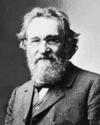- Metchnikoff, Élie
-
died July 16, 1916, Paris, FranceRussian zoologist and microbiologist.In 1888 Louis Pasteur offered him a post at the Pasteur Institute, and he succeeded Pasteur as director in 1895. Working with starfish, he discovered amoebalike cells in their systems that engulf foreign bodies such as bacteria. He established that phagocytes (as he named these cells, using the Greek for "devouring cells") are the first line of defense against acute infection in most animals. This phenomenon, now known as phagocytosis, is fundamental to immunology. He shared a 1908 Nobel Prize with Paul Ehrlich.
 Élie Metchnikoff.H. Roger-Viollet
Élie Metchnikoff.H. Roger-Viollet* * *
▪ Russian biologistRussian in full Ilya Ilich Mechnikovborn May 16, 1845, near Kharkov, Ukraine, Russian Empire [now Kharkiv, Ukraine]died July 16, 1916, Paris, FranceRussian zoologist and microbiologist who received (with Paul Ehrlich (Ehrlich, Paul)) the 1908 Nobel Prize for Physiology or Medicine for his discovery in animals of amoeba-like cells that engulf foreign bodies such as bacteria—a phenomenon known as phagocytosis and a fundamental part of the immune response.Metchnikoff received his bachelor's degree from the University of Kharkov (1864) and completed his doctoral degree at the University of St. Petersburg (1868). He served as professor of zoology and comparative anatomy at the University of Odessa (1870–82). In Messina, Italy (1882–86), while studying the origin of digestive organs in bipinnaria starfish larvae, he observed that certain cells unconnected with digestion surrounded and engulfed carmine dye particles and splinters that he had introduced into the bodies of the larvae. He called these cells phagocytes (from Greek words meaning “devouring cells”) and named the process phagocytosis.Working at the Bacteriological Institute, Odessa (1886–87), and at the Pasteur Institute, Paris (1888–1916), Metchnikoff contributed to many important discoveries about the immune response. Perhaps his most notable achievement was his recognition that the phagocyte is the first line of defense against acute infection in most animals, including humans, whose phagocytes are one type of leukocyte, or white blood cell. This work formed the basis of Metchnikoff's cellular (phagocytic) theory of immunity (1892), a hypothesis that engendered much opposition, particularly from scientists who claimed that only body fluids and soluble substances in the blood (antibodies)—and not cells—destroyed invading microorganisms (the humoral theory of immunity). Although the humoral theory held sway for the next 50 years, in the 1940s scientists began to reexamine the role cells play in fighting off infections. Eventually Metchnikoff's theory of cellular immunity was vindicated when aspects of both schools of thought became integrated in the modern understanding of immunity.Metchnikoff devoted the last decade of his life to investigating means of increasing human longevity and advocating the consumption of lactic acid-producing bacteria. He wrote Leçons sur la pathologie comparée de l'inflammation (1892; Lectures on the Comparative Pathology of Inflammation), L'Immunité dans les maladies infectieuses (1901; Immunity in Infectious Diseases), and Études sur la nature humaine (1903; The Nature of Man).* * *
Universalium. 2010.
